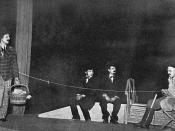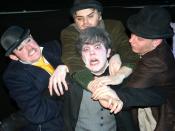It is unclear if Nell truly does die--Beckett was opaque about this in conversation as well, even with the actors he was directing. Assuming she has died, perhaps it is only temporary, and she will be resurrected the next day. In the cyclical world the characters inhabit, this is not an implausible idea--maybe her death is a daily routine. A more likely reason for her death is that Nell is the one character who understands her limitations--she knows that she and Nagg can't kiss, and calls the routines they go through a "farce." Her reward, then, is death, since she is the only one who accepts it in her life, while the others, Hamm especially, "hesitate" to "finish" life though they despise it. Her death also exposes the callous attitudes to death of the others. Nagg eats his biscuit and seems unfazed, and Hamm is even less perturbed. Ironically, while he shows little emotion at his mother's death, he remarks that Nagg seems to have quickly forgotten Nell, though Nagg was crying at one point.
Once a person is out of their lives, or knocked out of their circular loop, it is as if she has never existed. The characters' memories extend back to childhood, unlike in Waiting for Godot, where they have trouble remembering yesterday's events. Even so, they seem to displace that which has preceded them because if it does not affect them currently, it never will.


